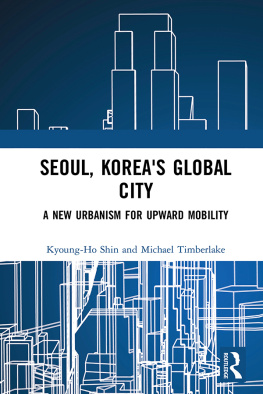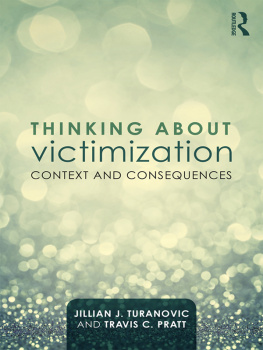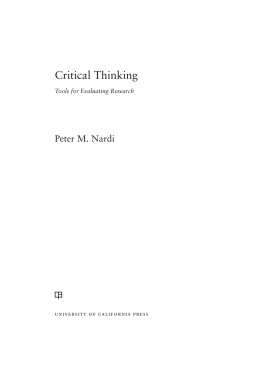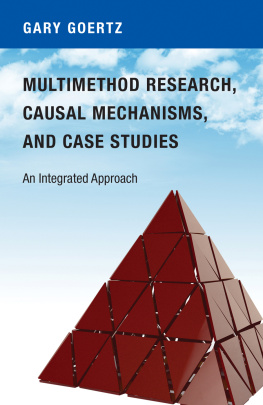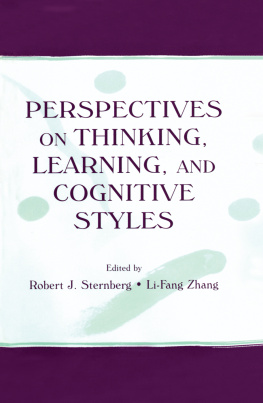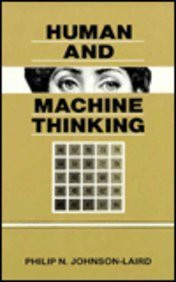Contents
Guide
Pagebreaks of the print version

The author and publisher have provided this e-book to you for your personal use only. You may not make this e-book publicly available in any way. Copyright infringement is against the law. If you believe the copy of this e-book you are reading infringes on the authors copyright, please notify the publisher at: us.macmillanusa.com/piracy.
To Marvin, Allison, and Nathan
WHEN I WAS A GRADUATE STUDENT at the University of Illinois at Urbana-Champaign, doing research in cognitive psychology, our lab group went out every now and then for nachos and beers. It was a great opportunity for us to ask our advisor about things that wouldnt likely come up in our more formal individual meetings. At one of those gatherings, I summoned up the courage to ask him a question that had been on my mind for some time: Do you think cognitive psychology can make the world a better place?
I felt a bit like my question was coming out of left field; having already committed my life to this area of study, it was a little late to be asking it. But even though I had presented my findings at cognitive science conferences around the world and was on track to publish them in respected psychology journals, I had been having a hard time explaining the real-life implications of my work to my friends from high school. On that particular day, after struggling to read a paper in which the authors primary goal appeared to be to show off how smart they were by tackling a convoluted problem that didnt exist in the real world, I finally found the courage to raise that questionwith some help from the beer.
Our advisor was famous for being obscure. If I asked him, Shall I do A or B for the next experiment?, he would either answer with a cryptic Yes, or turn the question around and ask, What do you think? This time I had asked him a simple yes-or-no question, so he chose a simple answer: Yes. My lab mates and I sat there silently for what felt like five minutes, waiting for him to elaborate, but that was all he said.
Over the course of the next thirty or so years, Ive tried to answer that question myself by working on problems that I hope have real-world applications. In my research at Yale University, where Ive been a professor of psychology since 2003, Ive examined some of the biases that can lead us astrayand developed strategies to correct them in ways that are directly applicable to situations people encounter in their daily lives.
In addition to the specific biases Ive chosen to research, Ive also explored an array of other real-world thinking problems that can cause issues for myself and those around mestudents, friends, family. I saw how my students procrastinate because they underestimate the pain of doing an assignment in the future as opposed to doing exactly the same thing right now. I heard from a student who told me about a doctor who misdiagnosed her because he only asked questions that confirmed his original hypothesis. I noted the unhappiness of people who blame themselves for all their troubles because they only see one side of reality, and the unhappiness caused by other people who never see themselves as being at fault for anything at all. I witnessed the frustration of couples who thought they were communicating with perfect clarity but actually were completely misunderstanding each other.
And I also saw how thinking problems can cause troubles that go far beyond individuals lives. These fundamental errors and biases contribute to a wide range of societal issues, including political polarization, complicity in climate change, ethnic profiling, police shootings, and nearly every other problem that stems from stereotyping and prejudice.
I introduced a course called Thinking to show students how psychology can help them recognize and tackle some of these real-world problems and make better decisions about their lives. It must have filled a real need, because in 2019 alone, more than 450 students enrolled in it. It seemed they craved the kind of guidance psychology could provide, and they told one another about it. I then noticed a curious thing: when I was introduced to students family members who were visiting campus, they would often tell me how the students in my course would call home to talk about how they were learning to handle problems in their livesand that some had even started advising other family members, their parents included. Colleagues told me they overheard students in the dining halls fiercely debating the implications of some of the experiments the course covered. When I would talk to people outside the profession about the issues discussed in the course, they asked me where they could learn more. All of this suggested that people really wanted and needed these kinds of tools, so I decided to write a book to make some of these lessons more broadly available.
I selected eight topics that I found most relevant to the real-life problems that my students and others (including myself!) face day to day. Each chapter covers one of them, and while I refer to material from throughout the book when relevant, the chapters are written so they can be read in any order.
Although I talk about errors and biases in thinking, this book is not about what is wrong with people. Thinking problems happen because we are wired in very particular ways, and there are often good reasons for that. Reasoning errors are mostly by-products of our highly evolved cognition, which has allowed us to get this far as a species and to survive and thrive in the world. As a result, the solutions to these problems are not always easily available. Indeed, any kind of de-biasing is notoriously challenging.
Furthermore, if we are to avoid these errors and biases, merely learning what they are and making a mental note that we should not commit them is not enough. Its just like insomnia; when it happens, you clearly know what the problem isyou cant sleep well. But telling insomniacs that they should sleep more will never be a solution for insomnia. Similarly, while some of the biases covered in this book may already be familiar to you, we need to provide prescriptions that are better than simply saying, Dont do that. Fortunately, as a growing number of studies attest, there are actionable strategies we can adopt to reason better. These strategies can also help us figure out which things we cant control, and even show us how solutions that might initially seem promising can ultimately backfire.
This book is based on scientific research, mostly from other cognitive psychologists but also on some that I carried out myself. Many of the studies I cite are considered classics that have stood the test of time; others represent the latest results from the field. As I do in my course, I give a variety of examples taken from widely different aspects of our lives to illustrate each point. Theres a reason for that, and youll find out why.
So, back to the question I asked my advisor: Can cognitive psychology make the world a better place? In the years since I first posed it, Ive come to believe ever more strongly that the answer is indeed, as my advisor so aptly replied, Yes. Absolutely yes.
WITH 450 SEATS, LEVINSON AUDITORIUM is one of Yale Universitys largest lecture halls, and on Mondays and Wednesdays between 11:35 and 12:50, when my undergraduate course titled Thinking meets, nearly every seat is filled. Todays lecture on overconfidence is likely to be especially entertaining, as my plan is to invite some students to come up to the front and dance to a K-pop video.


